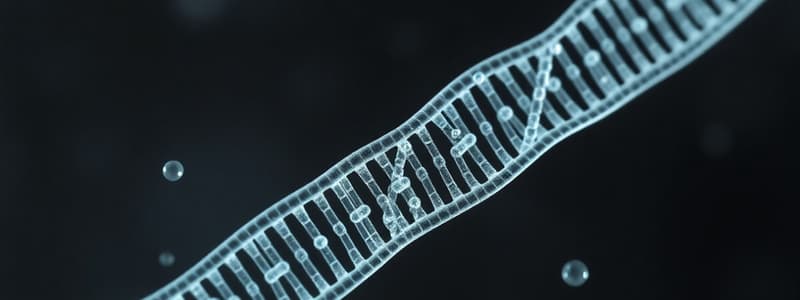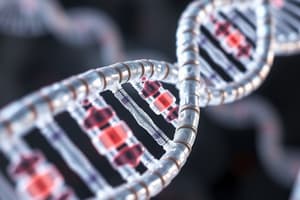Podcast
Questions and Answers
What do restriction endonucleases specifically cut within the DNA?
What do restriction endonucleases specifically cut within the DNA?
- Nucleotide sequences at restriction sites (correct)
- Non-coding regions of DNA
- Proteins on the DNA strand
- RNA sequences in the genome
Which method increases cell membrane permeability to facilitate DNA uptake?
Which method increases cell membrane permeability to facilitate DNA uptake?
- Dehydration
- Fermentation
- Heat shock (correct)
- Cell lysis
During molecular cloning, what is the first step in the procedure?
During molecular cloning, what is the first step in the procedure?
- Selection of recombinant cells
- Insertion into a vector
- Transformation into a host cell
- Isolation of the DNA of interest (correct)
What is the primary indicator of successful cloning in blue-white screening?
What is the primary indicator of successful cloning in blue-white screening?
What characterizes competence in cells during transformation?
What characterizes competence in cells during transformation?
Which of the following processes involves the use of calcium chloride?
Which of the following processes involves the use of calcium chloride?
What type of ends can restriction endonucleases create during DNA cutting?
What type of ends can restriction endonucleases create during DNA cutting?
What is a common use for antibiotic resistance in molecular cloning?
What is a common use for antibiotic resistance in molecular cloning?
Which component of blue-white screening indicates the presence of non-recombinant plasmids?
Which component of blue-white screening indicates the presence of non-recombinant plasmids?
What is the role of a cloning vector in molecular cloning?
What is the role of a cloning vector in molecular cloning?
Study Notes
Restriction Endonucleases
- Enzymes that cut DNA at specific sequences called restriction sites.
- Recognize palindromic sequences, meaning the sequence reads the same forwards and backwards on opposite strands.
- Create either blunt or sticky ends, which are used in genetic engineering to splice DNA fragments.
Competence
- Ability of a cell to take up extracellular DNA from its environment during transformation.
- Can occur naturally in some bacteria, such as Streptococcus.
- Can be induced through chemical treatments, like calcium chloride, which increases membrane permeability.
- Electroporation uses an electric field to create temporary pores in the cell membrane, allowing DNA to enter.
- Heat shock involves exposing cells to a sudden increase in temperature, creating membrane pores for DNA uptake.
Molecular Cloning Steps
- Isolation of DNA of interest: The gene to be cloned is cut using restriction enzymes.
- Insertion into a vector: The isolated DNA is ligated (joined) into a cloning vector, such as a plasmid.
- Transformation into a host cell: The recombinant vector is introduced into a competent host cell, usually bacteria.
- Selection of recombinant cells: Cells that have successfully taken up the recombinant DNA are selected using antibiotic resistance or reporter genes.
Blue-White Screening
- Technique used to differentiate between bacterial colonies that contain recombinant plasmids and those that do not.
- Bacteria with non-recombinant plasmids produce a blue color due to β-galactosidase activity.
- Bacteria with recombinant plasmids produce white colonies because the insertion of foreign DNA disrupts the lacZ gene, preventing β-galactosidase production.
Studying That Suits You
Use AI to generate personalized quizzes and flashcards to suit your learning preferences.
Description
Test your knowledge on molecular cloning techniques, including the role of restriction endonucleases and cell competence. This quiz covers the mechanisms by which cells take up DNA and the steps involved in cloning specific genes. Perfect for students in molecular biology or genetics courses.




